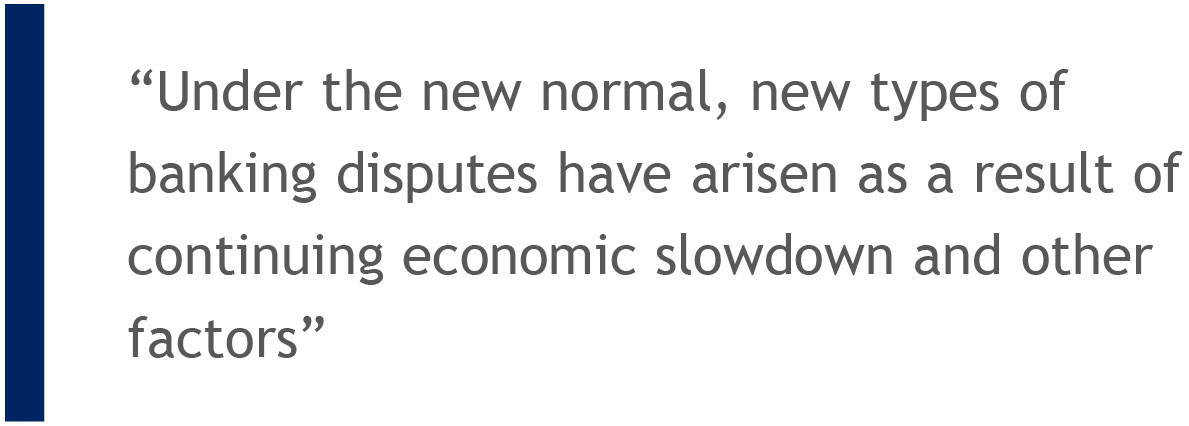 By Wilson Wei Huo, Partner, Zhong Lun Law Firm
By Wilson Wei Huo, Partner, Zhong Lun Law Firm
New methods of financing and challenging economic conditions have fuelled new types of disputes.
Banking dispute is defined in a broad sense in this article, referring to a dispute where one of the parties is a banking or financial institution, such as a bank, a securities company or a fund management company. This article focuses on the recent developments of banking dispute resolution in China (in this article, China refers to mainland China). It is known that the laws of China belong to the civil law system, in which statute form the sources of law.
SOURCES OF BANKING DISPUTE RESOLUTION
i. Common sources of banking dispute resolution
In China, common banking disputes mainly relate to, among other things, lending and loans, guarantees, bankcards, financial leasing, securities, futures business, commercial instruments, trust and letter of credit. These disputes not only happen between financial institutions and financiers, but also among financial institutions or between financial institutions and investors.
ii. Sources of banking dispute resolution after the recent development of China’s economy under the “new normal”
Under the new normal, new types of banking disputes have arisen as a result of continuing economic slowdown, structural economy problems, supply-side structural reform, innovation of the internet and other factors.
Bond default disputes
The bond market in China has witnessed a large amount of bond defaults in recent years, including but not limited to defaults of corporate bonds, enterprise bonds, medium-term notes, short-term financing bonds, small and medium enterprises’ collection notes, and other types of bonds that are traded in the inter-bank market and the exchange market.
Private equity investment disputes
As stated in the 2017 Work Report of the SPC, along with the fast development of private equity investment (PE) in China, new types of PE disputes have arisen, such as private-equity partnership disputes, valuation adjustment mechanism disputes, equity repurchase disputes and corporate control disputes.
 Internet financing disputes
Internet financing disputes
Despite the combined positive effects on the economy, the existence of mobile internet, e-business and internet finance, such as peer-to-peer lending and mass and accumulative fundraising, and third-party payment platforms have caused complex and diverse disputes.
Generally, the inapplicability of the traditional principle to determine jurisdiction, the normalisation of class actions with small disputed amounts, and the wide usage of electronic evidence are the common features in internet financing disputes.
Other banking disputes
In addition, the number of disputes in connection with derivatives and trade financing has increased dramatically in China in recent years.
iii. Significant Recent Cases
China adopted the guiding cases system on 26 November 2010. The SPC is in charge of selecting and releasing guiding cases. In addition to guiding cases, the SPC regularly releases typical and influential cases in its gazette (the SPC Gazette). Outlined below are some significant recent cases released by the SPC or represented by Zhong Lun relating to complicated issues such as pledge of rights, pledge of funds, guarantee obligation and entrusted loans.
In Fuzhou Wuyi Sub-branch of Fujian Haixia Bank Co, Ltd v. Changle Yaxin Sewage Treatment Co, Ltd and Fuzhou Municipal Engineering Co, Ltd (guiding case No. 53 concerning a dispute over a loan contract), the court ruled that the right to receive proceeds from franchises may be pledged and registered as a pledge of account receivable. Where the pledgee claims for priority right for compensation therein but it is inappropriate to liquidate, auction or sell off the aforesaid pledged right, the court may order the pledger to make a priority payment to the pledgee from the proceeds of the account receivable.
In Anhui Branch of Agricultural Development Bank of China v. Zhang Dabiao and Anhui Changjiang Financing Guarantee Group Co, Ltd (guiding case No. 54 concerning a dispute over an objection to enforcement), the court ruled that the fact that the account balance in the special bank account occasionally floats shall not affect the validity of the pledgee’s right over the pledged funds deposited in the special bank account as long as three requirements have been met. First, the pledger has opened the bank account and deposited such funds for the purpose of providing collateral to the pledgee. Secondly, the pledgee lawfully possesses and controls the bank account. Thirdly, the pledged property has been specified and the possession has been transferred from the pledger to the pledgee.
 In Ningbo Branch of Wenzhou Bank Co, Ltd v. Zhejiang Chuangling Electric Appliance Co, Ltd (guiding case No. 57 concerning a dispute over a financial loan contract), the court held that when a creditor has entered into several maximum guarantee contracts with guarantors but failed to specify some of those guarantee contracts under the master loan contract, those guarantors though not expressly stated under the master loan contract shall still be liable for the indebtedness, so long as the debts have been incurred during the time limit of the guaranty liability provided under the maximum guarantee contracts and the creditor does not expressly waive its right against the guarantors.
In Ningbo Branch of Wenzhou Bank Co, Ltd v. Zhejiang Chuangling Electric Appliance Co, Ltd (guiding case No. 57 concerning a dispute over a financial loan contract), the court held that when a creditor has entered into several maximum guarantee contracts with guarantors but failed to specify some of those guarantee contracts under the master loan contract, those guarantors though not expressly stated under the master loan contract shall still be liable for the indebtedness, so long as the debts have been incurred during the time limit of the guaranty liability provided under the maximum guarantee contracts and the creditor does not expressly waive its right against the guarantors.
In Beijing Changfu Investment Fund v. Wuhan Zhongsenhua Century Real Estate Development Co, Ltd et al (a case of a dispute over an entrusted loan contract), the court held that when the entrusted bank lent the loan to the borrower under the instruction of the lender without assuming any legal risks or liabilities under the loan contract entered into between the lender, the entrusted bank and the borrower, such loan shall be deemed as ‘private lending’ rather than lending by a financial institution. Laws, regulations and judicial interpretations concerning ‘private lending’ are applicable to the validity of the entrusted loan contract as well as its main provisions (interests, default interests and damages).
In Dalian Donggang Sub-Branch of China Merchants Bank Co, Ltd v. Dalian Zebon Fluorocarbon Paint Stock Co, Ltd and Dalian Zebon Group Co, Ltd (a case of a dispute over a loan contract), the defendant, as the guarantor, argued that its legal representative acted beyond his authority to enter into the guarantee contract and the shareholders’ meeting resolution to provide a guarantee to its shareholder was falsified. The court ruled that pursuant to Article 16 of the Company Law, if a company intends to provide a guarantee to its shareholder or its actual controller, the shareholders’ meeting or the shareholders’ assembly shall pass a resolution for such decision. However, this provision was designed for the company’s internal management and should not be used to determine the validity of the guarantee contract. If the company, as the guarantor, later argues that its legal representative acted beyond his or her authority to enter into the guarantee contract, the court shall rule in favour of the creditor’s claim as long as the creditor proves that the relevant shareholders’ meeting resolution meets the formality requirements and the act of the legal representative constitutes an ‘apparent’ representation of the company.
 In A Fund Company v. A Real Estate Development Company (a case of a dispute over an entrusted loan contract represented by Wilson’s team), the lender entrusted a bank (the entrusted bank) to lend money to the borrower. The borrower provided its land-use right as collateral and registered such security interest under the name of the entrusted bank. In precedent cases, courts held that the lender was not entitled to sue the borrower directly because of the doctrine of the privity of contract. However, in this case, the court made an important breakthrough and ruled that the lender could initiate the lawsuit directly against the borrower and seek enforcement of its security interests as the actual creditor.
In A Fund Company v. A Real Estate Development Company (a case of a dispute over an entrusted loan contract represented by Wilson’s team), the lender entrusted a bank (the entrusted bank) to lend money to the borrower. The borrower provided its land-use right as collateral and registered such security interest under the name of the entrusted bank. In precedent cases, courts held that the lender was not entitled to sue the borrower directly because of the doctrine of the privity of contract. However, in this case, the court made an important breakthrough and ruled that the lender could initiate the lawsuit directly against the borrower and seek enforcement of its security interests as the actual creditor.
In T Securities Company v. A Bank (a case of a dispute over transferring property that had been frozen by the court and another case represented by Wilson’s team), the debtor has pledged a listed company’s stocks as collateral to the creditor, a securities company (the T Securities Company). After obtaining an arbitral award confirming its creditor’s right against the debtor, T Securities Company applied for enforcement before court A. However, the debtor’s other creditor, a bank, initiated a lawsuit against the debtor before court B, claiming that the debtor is not the lawful owner of the stocks pledged to T Securities Company. Court B then froze the stocks upon the bank’s application for property preservation. T Securities Company’s attorney, a member of Zhong Lun, applied with court A to realise T Securities Company’s creditor’s security interest. In the meantime, Zhong Lun applied to court B, the court that had frozen the property, to transfer the pledged stocks to court A for enforcement as court B has failed to enter into any auction or sales procedures in respect of the frozen property after 60 days of the start of the property preservation procedures. Eventually, the courts sustained Zhong Lun’s applications and requests.
iv. Looking Ahead
In China, the slowdown of the economy has profoundly influenced banking and financing investments and the resolution of relevant disputes. As a result, banking disputes have revealed four new trends, namely complexity, expansion, quantification and crowded disputes. Complexity refers to the fact that professional, complicated and innovative banking and financing investments have given rise to sophisticated disputes. Notably, the range of banking disputes has expanded dramatically along with the recent development of new methods of financing, in which the parties involved are becoming increasingly diverse, which has imposed unprecedented challenges on the regulatory framework. In addition, the number of banking disputes, as well as the amounts involved in such disputes, has grown. Newly emerged economic problems under the new normal have resulted in a lot of defaults and the disputed amounts often exceed hundreds of millions. Numerous individual investors are also involved in banking disputes, which means that financial institutions are being dragged into class actions initiated by those who failed to profit and even lost their principal investment.
The above-mentioned trends in banking disputes call for creative resolution under the new normal, which requires the foresight of the regulatory authorities, precautionary measures adopted by financial institutions, support from the judicial system and the arbitration institutions, as well as intelligence, courage, and professionalism of legal practitioners.














































